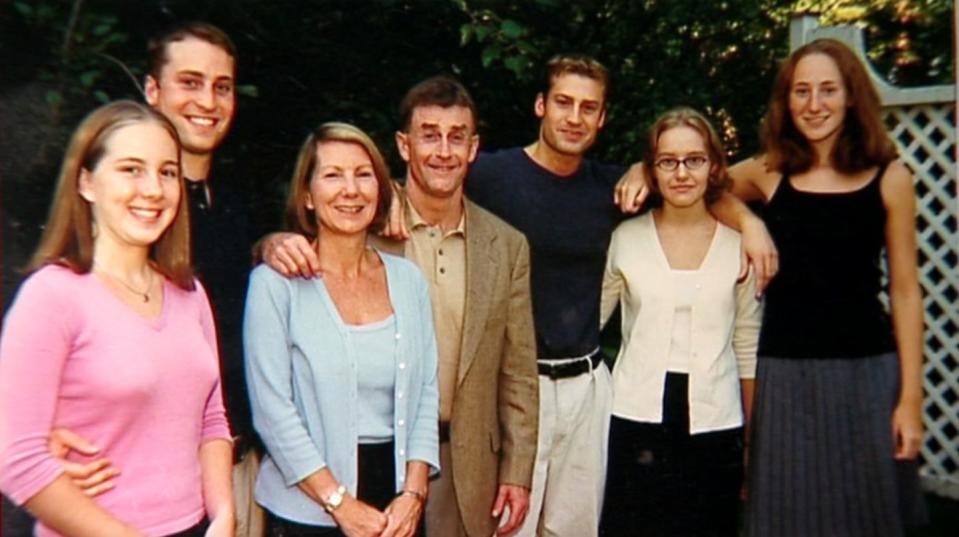The Staircase raises VERY important true-crime question

Warning: contains spoilers for The Staircase
The Staircase is the latest true-crime series to have audiences around the world gripped. The 13-part docu-series hit Netflix last week, merging the 2004 original and the 2013 follow-up with three all-new episodes that push the investigation of Michael Peterson further.
In 2018, following the undoubted successes of Netflix's Making A Murderer and the podcast Serial, it's certainly cool to be an armchair detective, with internet sleuths spending hours debating the evidence and theories surrounding cases that may otherwise have gone under the radar, making the genre one of the most addictive forms of factual entertainment.
But it can be easy to forget that the stories in question are based on real-life criminal cases, with a victim at the centre who has family members the are affected. Not only does this often raise ethical questions as to whether or not our sometimes insatiable obsession is exploitative, but for the filmmakers themselves there are issues of impartiality, particularly when the material is so emotive, that they can struggle to square off.

In the case of The Staircase, the question of Peterson's guilt is still up for debate for many viewers, despite the terms of his Alford plea (a guilty plea with which a defendant asserts his innocence but admits that sufficient evidence exists to convict him) and the fact he always protested his innocence. It is worth noting that this was never a question that The Staircase or its creator was looking to answer.
Jean-Xavier de Lestrade – fresh from making his Oscar-winning 2001 documentary Murder on a Sunday Morning, which followed the journey of 15-year-old Brenton Butler, a black high-school student who was accused and tried for murder – wanted to explore the process from a different perspective. The purpose of this documentary was to take a long, hard look at the justice system through the eyes of an arguably privileged man who had the money and means to defend himself.
Spanning some 16 years, the filming of The Staircase has now followed every twist and turn in the case, from Michael's initial arrest right through to his appeal for a retrial. The production team has had incredible, constant access to Michael, his family and his defense team – which, of course, could raise questions around whether or not the result is something of a one-sided view.

Peterson is a story-teller – he made a living writing novels, after all – and there's no denying that his wit and charisma made him a pretty likeable character on the surface. In episode 13, one of Netflix's newbies, the question is raised as to whether or not he had perhaps used this charm to manipulate the filmmakers into favouring his side of the story.
"Of course, Michael Peterson is very articulate," De Lestrade told journalists including Digital Spy. "He's very smart. He's a writer. He likes to talk... and, of course, he tried to seduce the camera. To seduce the crew... But I always try to keep the right distance between him and me... I never forgot that he was the subject."
The producer of the series added: "Our role is not to find justice. The problem with the distance of the character is always something that's tricky."
It could be argued that there needs to be a degree of trust on both sides. In the first period of filming alone, the crew captured more than 800 hours of footage. Ultimately, they are the ones in charge of what makes the final cut, so Peterson's portrayal is in their hands through the editing process.

Yet the subject can also control their behaviour in front of the camera, if they so choose. This notion begs the question: how much can you rely on a series to capture an accurate, and unbiased, representation of the main subject?
"If a documentary filmmaker is telling you, 'We never influenced what happened,' that's bullshit," De Lestrade told Digital Spy. "Even if you don't want to influence it, your presence changes the way that people react."
You would reasonably expect this to be true of human behaviour in any given scenario, but if you happen to be fighting a murder charge it could be said that you have even more reason to want to sway an audience a certain way.

Going one step further, De Lestrade even concedes that the very presence of the crew may have a subliminal influence on the key players of the court case as well.
"Maybe they will work harder on the case because we're shooting everything," he said. "Maybe the judge will be more cautious about all the decisions, and the prosecution... Obviously we didn't change the decision of the jury, of course."
Crime documentaries are definitely entertaining and can certainly play an important role in shedding light on injustices and highlighting flaws in the justice system. This is something that needs to continue if we are ever to make improvements for individuals that are suffering the results of an unfair trial, as well as spurring long-term change for the handling of crime in society.
But when it comes to the issue of objectivity and impartiality, the responsibility ultimately lies with the conviction of the filmmaker. We may have to make peace with the pay-off that, by their very nature, the presence of cameras will undoubtably bring about a new variable to consider as a viewer.
The Staircase is streaming now on Netflix.
Want up-to-the-minute entertainment news and features? Just hit 'Like' on our Digital Spy Facebook page and 'Follow' on our @digitalspy Twitter account and you're all set.
You Might Also Like

 Yahoo News
Yahoo News 
